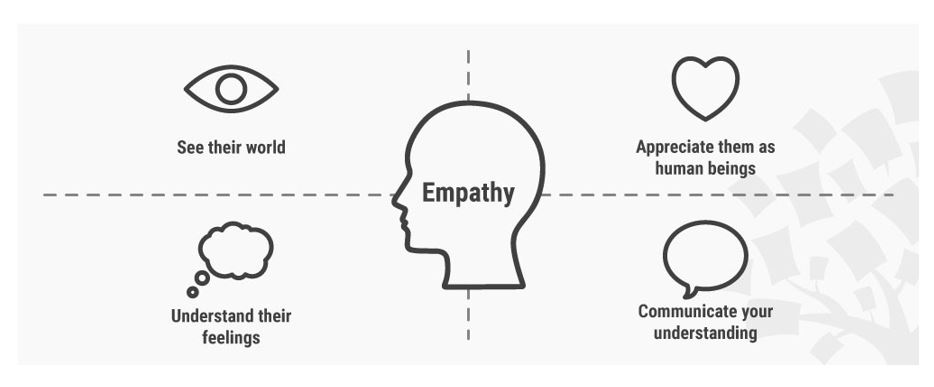“Learning to stand in somebody else’s shoes, to see through their eyes, that’s how peace begins. And it’s up to you to make that happen. Empathy is a quality of character that can change the world.” – Barack Obama
Empathy is an unforced prosocial i.e. helping behavior that comes from within oneself, it encourages the formation of a compassionate society that believes in understanding an individual before acting or responding upon they actions or circumstances. Empathy in the words of Alfred Adler is seeing with the eyes of another, listening with the ears of another and feeling with the heart of another, which in other words means the tendency to share and comprehend others state. It is one of the prime aspects the make us human. Psychologists identify two components of empathy namely, Cognitive empathy-perspective taking- involves thinking consciously about how another person views the world and Affective empathy-generally an automatic process-that involves connecting emotionally with someone else.

Why is empathy important ?
Empathizing is often identifying and understanding what others are feeling and communicating about it. Empathy is the missing link in families, schools and workplaces. The skill of empathy reflects a person’s ability to make people feel valued and safe, when person’s in authority listen, using empathy to understand what the person is feeling or thinking without trying to fix/change or solve their problem, they feel valued as a human being. Showing affective (emotional) empathy to others usually helps deepen a relationship between friends, co-workers and couples.
Who is an empath ?
Psychologist often use the term ‘Empath’ to describe an highly sensitive individual who has an acute ability to sense other people’s feelings and thoughts, in other words someone who experience a great deal of empathy. Empaths often tend to empathise to a point of taking of others at their own expense. A significant ability of an empath is being able to feel and relate to others emotions, which enhances one’s capability for love and compassion that is very difficult for others to ever accomplish. Other than advantages, the drawbacks are also significant such as directly experiencing what others feel, without the ability to pick and choose what you yourself feel is potentially high risked and draining both psychologically and emotionally. It can also make one highly sensitive, meaning that empaths may tend to become easily overwhelmed in various circumstances.
Greenson’s model of empathy:
Greenson articulated a model of empathy that is critical in his description of empathy, it is based on his own self-observation, and provides a lens via which he connects with the patient and accurately understand the situations. The working model is the central to the description of empathy and presents a detailed account of the therapist’s experience. According to Greenson, identification is permanent and unconscious while empathy is temporary and preconscious, identification differs from empathy and is still closely related. Greenson doesn’t state any use of regression in his model of empathy.

Is it always good to be empathetic?
“Empathy grows as we learn.” – Alice Miller
Empathy get easier to understand when one is able to understand whether it is needed to think about other person’s point of view, connect with their feelings or both. Using empathy alone might be complex, yet it highly depends on how one delivers empathy considering different circumstances as over using empathy could result in overwhelming amounts of stress. Empathy isn’t always good or bad, the definite answer to always being empathetic or never being empathetic, is that one is better of being empathetic. But only if one doesn’t go to the extremes, being empathetic when starting relationships or building connections can have a significantly good impact, whereas at times it can be associated with bad outcomes like being taken advantage of or manipulation. Thus, it is crucial to understand that just being empathtic is not enough, it is important to take into account the circumstances under which empathy is being used.
By: Tanaya Poopal

